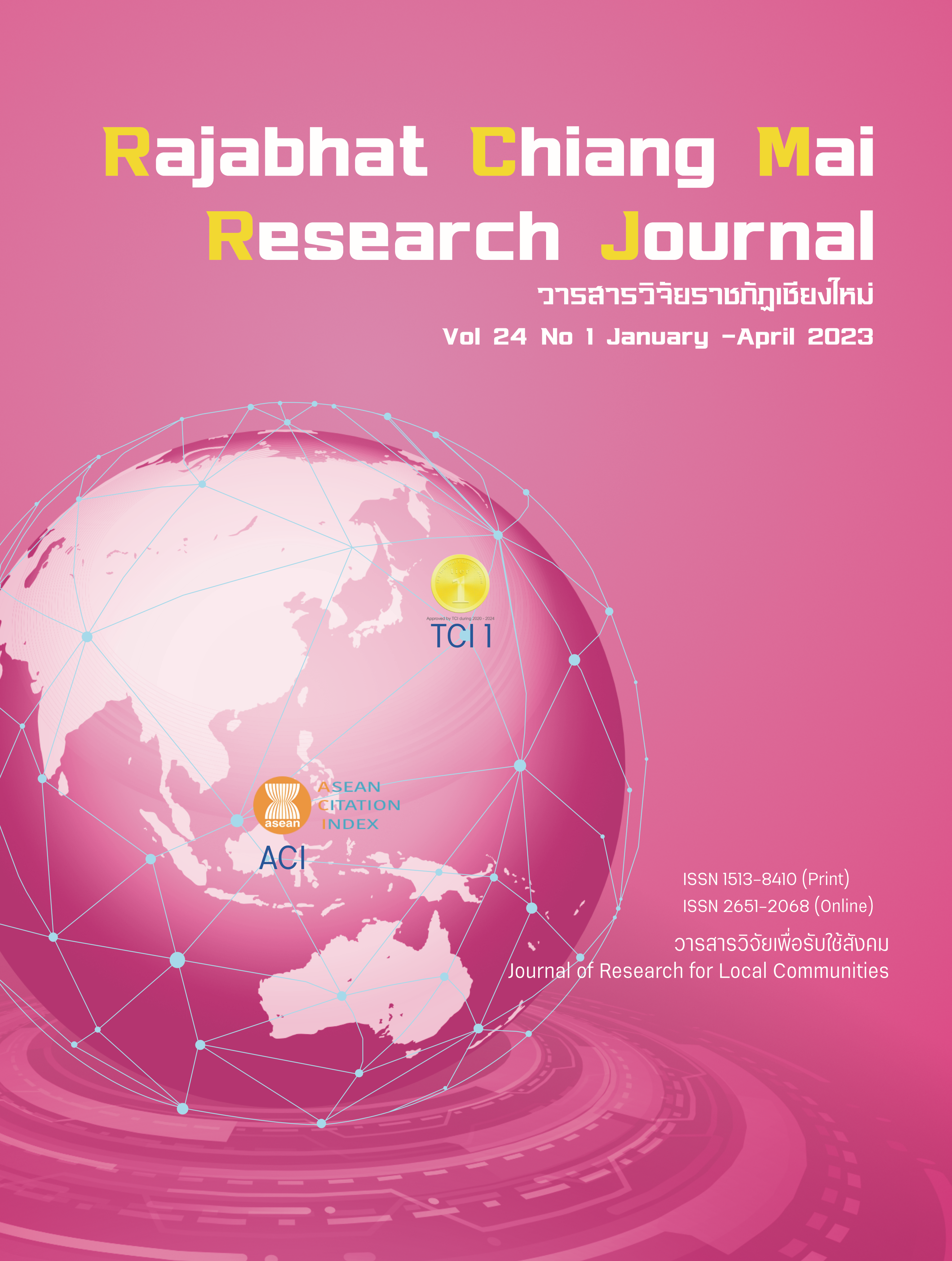Measures to Promote Creative and Safe Online Games for Children and Youth Through a Collaboration Network
DOI:
https://doi.org/10.57260/rcmrj.2023.261694คำสำคัญ:
Gaming policy, Juvenile, Online game, Creative game, Safe gameบทคัดย่อ
Nowadays, children and youth have easy access to online games. Inappropriate online gaming can be harmful to young people. As a result, the purpose of this research study is to study the situation of online games and online gaming among children and youth, and to create a network of collaboration in order to develop measures to promote creative and safe online games for youth through research and development (R&D). The findings revealed that Thai children and youth play more online games, and Thailand still has legal restrictions on online game services. The measures to promote creative and safe online games for children and youth are based on the principle of "controlling and promoting", which consists of (1) controlling the manufacturing process; (2) controlling the process of providing online game services; (3) surveillance and supervision (4) promoting the production of creative and safe games; (5) promoting secure gaming online. The implementation of measures requires mechanisms at both the policy and operational levels; It should be implemented in a network affiliate manner to promote the products and services of creative and safe online games for young people.
Downloads
เอกสารอ้างอิง
Bronfenbrenner, U. (1977). Toward an experimental ecology of human development. American Psychologist. 32(7), 513 - 531. DOI: 10.1037/0003-066X.32.7.513
Coon, D., & Mitterer, J.O. (2008). Introduction to Psychology: Gateways to Mind and Behavior. 4thed. Belmont, CA: Wadsworth.
Costa, P. T. Jr., & McCrae, R. R. (1994). Set like plaster? Evidence for the stability of adult personality. In T. F. Heatherton & J. L. Weinberger (Eds.), Can personality change? (pp. 21–40). American Psychological Association. https://doi.org/10.1037/10143-002
Davis, S. F., & Palladino, J. J. (2002). Psychology. (3rd ed.). Upper Saddle River, NJ: Prentice-Hall, Inc.
Hongsibsong, P., Toemsombatthaworn, N., & Narinrat, S. (2014). Need to solve the problem of the online games and internet of young people in Du Tai municipality, Nan. RMUTP Research Journal, Special Issue. 119-124. http://repository.rmutp.ac.th/handle/123456789/1676 (In Thai)
Kaewkangwan, S. (2018). Theory of personality psychology. (17th edition). Bangkok: Folk healers. (In Thai)
Kaewkla, P., & Srisomwong, R. (2017). Legal measures to protect the rights of online game service users. Journal of Humanities and Social Sciences, 6(1), 1-19. https://so05.tci-thaijo.org/index.php/MFUconnexion/article/view/241292 (In Thai)
LaPiere. (1954). A Theory of Social Control. New York: McGraw-Hill.
Marketeer. (2021, 12 February). Game Industry: The more you play, the more you grow. Business opportunities of entertainment media in the digital age. Retrieved from https://marketeeronline.co/archives/209418 (In Thai)
Palmer, J. E. (2003). Offending Behaviour: Moral Reasoning, Criminal Conduct and the Rehabilitation of offenders. Portland, Oregon: Willan Publishing.
Pavlov, I. P. (1960). Conditioned Reflexes. New York: Dover Reprints.
Peer Power. (2020, 19 June). Industry “Thai game” 2020. Retrieved from https://www. peerpower.co.th/blog/smes/thai-game-industry/ (In Thai)
Pengpan, K. (2017). Preventing health problems of childhood addicted to online games. Journal of Ratchathani Innovative Health Sciences, 1(1), 16-32. https://he02.tci-thaijo.org/index.php/JRIHS/article/view/171116/122950 (In Thai)
Phewku, C. (2017). Online game communities toward communities. Journal of MCU Social Science Review, 6(2-01), 143–158. https://so03.tci-thaijo.org/index. php/jssr/article/view/240198 (In Thai)
Radio and Media Association for Children and Youth (2021). The proposed policy to government agencies, the private sector, and civil society involved in measures to supervise and protect children and youth competing in video/online games to complete for eSports prize money safety and knowingly. Retrieved from chrome-extension://efaidnbmnnnibpcajpcglclefindmkaj/https://www.healthymediahub.com/storage/mediafiles/050070013W.pdf (In Thai)
Ramsutra, P. (2014). Immunization against online game addiction for Thai youth. Journal of Communication Arts, 32(2), 25-44. https://so02.tci-thaijo.org/index.php/jcomm/article/view/179045/127185 (In Thai)
Saengsuwan, T. (2018). The role of the network in community energy management: a case study of Singburi renewable energy group. (Master’s thesis, National Institute of Development Administration). (In Thai)
Social Communication Group Office of the National Health Commission. (2021). Research results indicate that children and youth are addicted to games on average 5 hours/day, costs 5,000 baht/month. Retrieved from https://www.nationalhealth.or.th/th/node/3006 (In Thai)
Srichairatanakul, J., Aphisitthiwat, N., & Thiammork, M. (2020). Teacher's Perspectives on Game Addiction of Students in Elementary Schools. Primary Education Area 2, Nakhon Pathom Province. Journal of Health and Nursing Research, 36(3), 244-258. https://he01.tci-thaijo.org/index.php/bcnbangkok/article/view/247023/167859 (In Thai)
This is Games. (2021, January 21). Newzoo analyzes the direction of the gaming industry in 2021. Retrieved from https://www.Thisisgame thailand.com/content/Newzoo-Predicted-Five-Trends-in-Gaming-Industry-This- Year.html (In Thai)
Wongyarit, A. (2010). Legal measures to control and supervise computer business. (Master of Law’s Thesis ,graduate school, Dhurakij Pundit University.) (In Thai)
Workpoint Today. (2021, 16 February). The game industry continues to grow, 'depa' expects this year to spread 3.3 billion baht to support the digital economy of Thailand. Retrieved from https://workpointtoday.com/depa-game-industry/ (In Thai)
ดาวน์โหลด
เผยแพร่แล้ว
รูปแบบการอ้างอิง
ฉบับ
ประเภทบทความ
สัญญาอนุญาต
ลิขสิทธิ์ (c) 2023 วารสารวิจัยราชภัฏเชียงใหม่

อนุญาตภายใต้เงื่อนไข Creative Commons Attribution-NonCommercial-NoDerivatives 4.0 International License.
1. บทความ ข้อมูล เนื้อหา รูปภาพ ฯลฯ ที่ได้รับการตีพิมพ์ใน “Community and Social Development Journal” ถือเป็นลิขสิทธิ์ของ Community and Social Development Journal มหาวิทยาลัยราชภัฏเชียงใหม่ และเพื่อให้เผยแพร่บทความได้อย่างเหมาะสมผ่านสื่อสิ่งพิมพ์และอิเล็กทรอนิกส์ ผู้เขียนยังคงถือครองลิขสิทธิ์บทความที่ตีพิมพ์ภายใต้ใบอนุญาต Creative Commons Attribution (CC BY) ซึ่งอนุญาตให้เผยแพร่บทความซ้ำในแหล่งอื่นได้ โดยอ้างอิงต้องอ้งอิงบทความในวารสาร ผู้เขียนต้องรับผิดชอบในการขออนุญาตผลิตซ้ำเนื้อหาที่มีลิขสิทธิ์จากแหล่งอื่น
2. เนื้อหาบทความที่ปรากฏในวารสารเป็นความรับผิดชอบของผู้เขียนบทความโดยตรง ซึ่งกองบรรณาธิการวารสารไม่จำเป็นต้องเห็นด้วยหรือร่วมรับผิดชอบใดๆ














